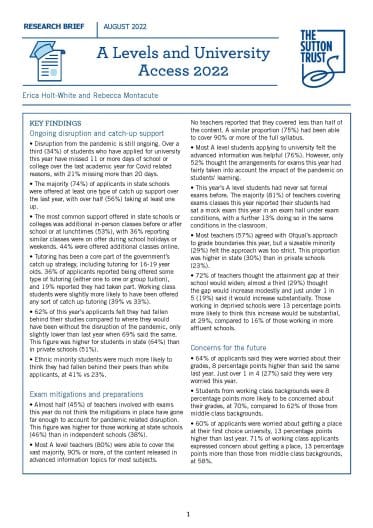Ongoing disruption and catch up support
- Disruption from the pandemic is ongoing, over a third (34%) of students who applied for university this year have missed 11 or more days of school or college over the last academic year for covid related reasons, with 21% missing more than 20 days.
- The majority (74%) of applicants in state schools were offered at least one type of catch up support over the last year, with over half (56%) taking at least one up.
- 62% of this year’s applicants felt they had fallen behind their studies compared to where they would have been without the disruption of the pandemic. This figure was higher for students in state (64%) than in private schools (51%).
Exam mitigations and preparations
- Almost half (45%) of teachers involved with exams this year do not think the mitigations in place have gone far enough to account for pandemic related disruption. This figure was higher for those working at state schools (46%) than in independent schools (38%).
- Most A level teachers (80%) were able to cover the vast majority, 90% or more, of the content released in advanced information topics for most subjects. No teachers reported that they covered less than half of the content. A similar proportion (75%) had been able to cover 90% or more of the full syllabus.
- Most A level students applying to university felt the advanced information was helpful (76%). But only 52% thought the arrangements for exams this year had fairly taken into account the impact of the pandemic on students’ learning.
- Most teachers (57%) agreed with Ofqual’s approach to grade boundaries this year, but a sizeable minority (29%) felt the approach was too strict. This proportion was higher in state (30%) than in private schools (23%).
Concerns for the future
- 64% of applicants said they were worried about their grades, 8 percentage points higher than said the same last year. Just over 1 in 4 (27%) are very worried this year.
- Students from working class backgrounds were 8 percentage points more likely to be concerned about their grades, at 70%, compared to 62% of those from middle class backgrounds.
- 60% of applicants were worried about getting a place at their first choice university. 71% of working class applicants expressed concern about getting a place, 13 percentage points more than those from middle class backgrounds, at 58%.
